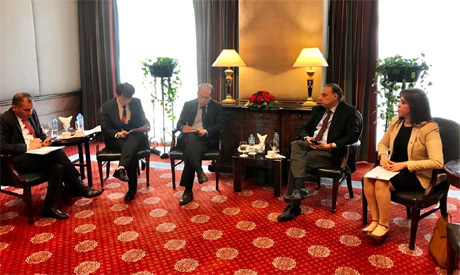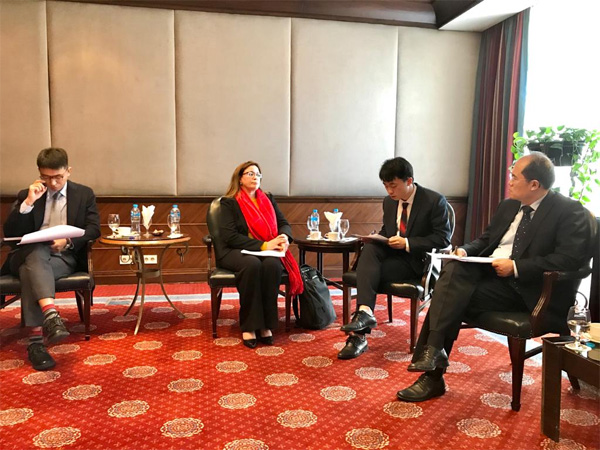The Chinese Embassy in Egypt held on Wednesday the first Chinese-Arab Diplomatic Salon on Coronavirus Crisis.
The symposium, organised at Cairo's Conrad Hotel, was chaired by Deputy Chief of Mission at the Chinese Embassy in Cairo Xiao Junzheng, with the participation of the Director of Early Warning Unit at the Egyptian Cabinet's Information and Decision Support Centre (IDSC) Samaa Suleiman, political science professor at Cairo University Mohamed Kamal, professor of risk management at Cairo University Ghada Ali, and head of the Asian Studies Programme at Al-Ahram Centre for Political and Strategic Studies Mohamed Fayez Farahat.
Xiao initially reviewed China's measures to combat the spread of the coronavirus epidemic. "China has mobilised its full efforts throughout all its provinces, and turned the fight into a popular war to prevent the spread of the virus and to eliminate it," Xiao said.
The virus is believed to have originated in a market selling wildlife in the Chinese city of Wuhan late last year. China's National Health Commission (NHC) reported on Wednesday 406 new infections, down from 508 a day earlier, bringing the total number of confirmed cases in mainland China to 78,064. The death toll rose to 2,715.
"A state of emergency has been declared in all Chinese provinces, and state resources are distributed across all the sectors where the virus has spread," Xiao said.
He added that some people believe that because China has a strong economic foundation, it has successfully harnessed its capabilities and implemented all the measures to combat the virus; and that it is difficult for countries suffering economic challenges to do the same.
"I personally disagree with this", Xiao continued, citing the Egyptian experience in eradicating bird flu (Avian influenza H5N1) in 2008-2009.
"Egypt enforced a host of preventive measures, including isolation in schools and hospitals," in addition to raising the people's awareness at mosques, and urging patients to seek treatment, he said.
Because coronavirus has become a global crisis, China is taking the opportunity to learn from successful experiences in this field, Xiao stated.
Suleiman reviewed Egypt's efforts to fight the virus, in addition to the preventive and precautionary measures at airports and educational institutions.
"Egypt was one of the first countries to send back, for free, its expats in Wuhan, and designated El-Negelah Central Hospital in Marsa Matrouh as a quarantine hospital to house the returnees," she said.
Last week, Health Minister Hala Zayed announced that Egypt has ended a 14-day quarantine for hundreds of Egyptians who had returned Wuhan, the epicentre of the coronavirus.
Egypt's Ministry of Health and the World Health Organisation (WHO) released a joint statement also last week that said the foreigner who was rumoured to be a carrier of the coronavirus in Egyp tested negative.
Globalisation vs coronavirus
"From the very beginning, China has taken a responsible attitude towards international cooperation. It has also balanced between the preventive and precautionary measures on one hand and international cooperation on the other," said Xiao.
On Tuesday, China's foreign ministry said that Beijing is working closely with the governments of Japan and South Korea, which recorded the highest number of people infected with the virus in Asia outside China, to strengthen the countries' joint response to the outbreak.
Kamal said that globalisation is believed to have an important role in the fight against coronavirus.
"Being a global crisis, there must be international cooperation to jointly combat the virus in addition to sharing and benefiting from other experiences," Kamal said.
Earlier this month, Egypt's health ministry announced that Egypt provided China with 10 tons of preventive medical items, such as masks and alcoholic antiseptics, to help deal with the epidemic.

Deputy Chief of Mission at the Chinese Embassy in Cairo Xiao Junzheng, centre, among other attendees of the symposium held in Cairo on Wednesday (Photo: Ahmed Morsy)
International cooperation in this regard, Kamal said, should not be limited to healthcare because the crisis is tied to the economy. The spread of coronavirus in China affected the majority of "international products, because most of them depend on Chinese parts and supply chains. Hence, cooperation should also include the economy," he added.
Farahat emphasised that the coronavirus crisis is a test for the Chinese concept of decentralisation, or China’s common destiny.
"As a result, China didn't export the outbreak as a global crisis, addressing the epidemic as if it were purely a Chinese crisis to some extent," said the head of the Asian Studies Programme at Al-Ahram Centre for Political and Strategic Studies.
China addressed the epidemic internally by means of a common community's destiny, but it should have taken another perspective and interacted with the whole world from the perspective of a common destiny, Farahat noted.
Many countries' economies were negatively affected by the repercussions of the spread of the coronavirus outside China, Farahat said, adding that China didn't compensate the affected countries nor cooperate in that field despite it being part of the Chinese responsibility towards the global economy.
Lessons learned
Farahat said "we are confident in China's ability to overcome this ordeal, and the way the crisis is being handled has demonstrated that civil society organisations and local institutions have a major role to play alongside decentralisation."
Kamal believes there are various lessons to be learned from the Chinese experience in combating the virus, among which are transparency and the importance of circulating information. Each has a fundamental role and without them public panic could have spread, exacerbating the crisis even further, he said.
"There is a need to document what happened and how China handled the situation to allow other countries to benefit from the Chinese experience," Kamal added.
Given the fact that sometimes transparency might be seen as a double-edged sword due to the possibility of spreading panic, Xiao responded to Ahram Online when asked how China has achieved transparency and at the same time delivered a sense of reassurance to its citizens, saying that "I agree that sometimes transparency results in panic. Maintaining a good balance between both aspects was the critical test for the Chinese government regarding good governance."

Deputy Chief of Mission at the Chinese Embassy in Cairo Xiao Junzheng, right, among other attendees of the symposium held in Cairo on Wednesday (photo: Ahmed Morsy)
On the governmental level, Xiao said, disseminating information is a principle of governance in China because people can be better mobilised by raising their awareness against possible dangers.
Although the spread of the epidemic coincided with the Chinese New Year that witnesses people's celebrations, gatherings and family visits, China cancelled the celebrations and asked the people to stay home to avoid the spread of the virus, he noted.
"If the government did not release all the information, there wouldn't have been sufficient awareness among the people to prevent infections," he added.
Kamal said that sometimes too much or too little information and transparency can cause panic among the masses.
"More important than publishing information is the means of publishing it," professor of risk management Ali said.
Transparency is indeed essential but sometimes using simple speech/language is needed to make the citizen aware of the correct information without causing panic or confusion, she added.
Short link: